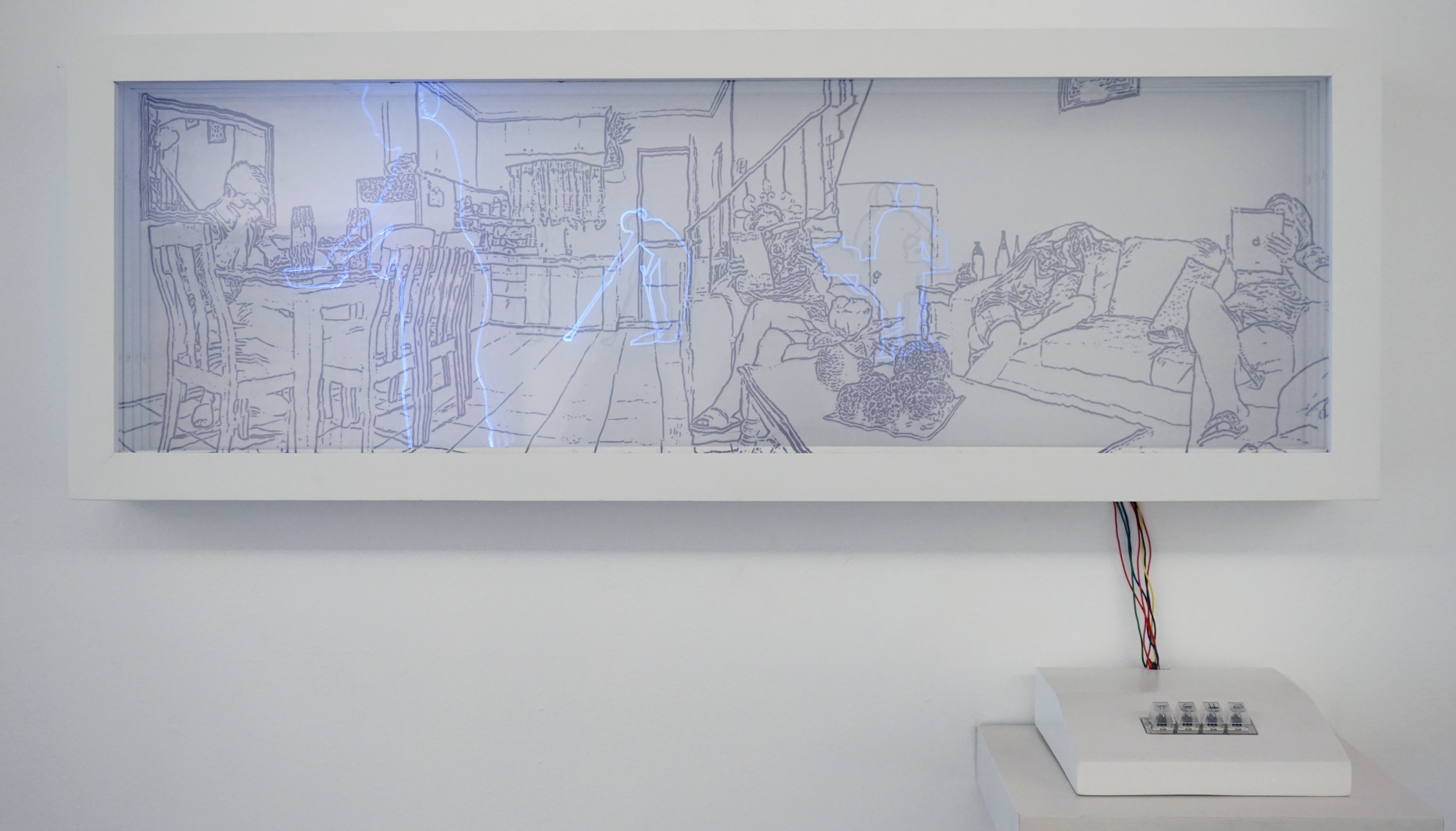ctrl(d)+shift(s)
Interactive Transmedia(Dye Sublimation on Organza, (3) Etched Plexiglass Panels, Acrylic, Wood, WS2812 LED, Microcontroller, Mechanical Switches, Custom Circuit Board.)
2019



Domestic work is both a fundamental and invisible aspect of Filipino society. The practice of employing household help is ingrained in our history, culture, and everyday life. Furthermore, the nature of the work itself is confined to private homes and is often unregulated; It is perceived as an invisible sector up until today (Sayres, 2007.)
Within households, domestic workers often have less control of their schedules and are designated certain household tasks as their primary obligations. Workers are oftentimes subject to receiving orders from their employers around-the-clock. Moreover, employers often control their spatial movements in the home as they decide upon the worker’s integration or separation from the family. Traditionally, spatial deference is established between the worker and the household.
“ctrl(d)+shift(s)” (read as controlled shifts) investigates the dialectics of control between employers and domestic help. Similarly, the work employs the concept of unidirectional control over the other.
The work is an interactive piece that consists of several layers of etched acrylic sheet lit by a programmed LED matrix which could be activated through a custom keypad. The work displays a silhouette of a person doing household tasks as commanded by the viewer through the use of the keypad. The tasks present in the work are common duties of household help. The command will only be recognized if the control (CTRL) button is pressed along with the viewer’s desired task (serve, clean, or iron.) Once a command has been prompted the etched acrylic sheet will light up the silhouette, in the respective area of the “home” to be attended to, then perform the sequence of the corresponding task chosen.
References:
Parreñas, R. S. (2015). Servants of Globalization: Migration and Domestic Work. Stanford, CA: Stanford University Press.
Sayres, N. J. (2007). An Analysis of the Situation of Filipino Domestic Workers. An Analysis of the Situation of Filipino Domestic Workers. International Labor Organization (ILO). Retrieved from https://www.ilo.org/wcmsp5/groups/public/@asia/@ro-bangkok/@ilo-manila/documents/publication/wcms_124895.pdf
Within households, domestic workers often have less control of their schedules and are designated certain household tasks as their primary obligations. Workers are oftentimes subject to receiving orders from their employers around-the-clock. Moreover, employers often control their spatial movements in the home as they decide upon the worker’s integration or separation from the family. Traditionally, spatial deference is established between the worker and the household.
“ctrl(d)+shift(s)” (read as controlled shifts) investigates the dialectics of control between employers and domestic help. Similarly, the work employs the concept of unidirectional control over the other.
The work is an interactive piece that consists of several layers of etched acrylic sheet lit by a programmed LED matrix which could be activated through a custom keypad. The work displays a silhouette of a person doing household tasks as commanded by the viewer through the use of the keypad. The tasks present in the work are common duties of household help. The command will only be recognized if the control (CTRL) button is pressed along with the viewer’s desired task (serve, clean, or iron.) Once a command has been prompted the etched acrylic sheet will light up the silhouette, in the respective area of the “home” to be attended to, then perform the sequence of the corresponding task chosen.
References:
Parreñas, R. S. (2015). Servants of Globalization: Migration and Domestic Work. Stanford, CA: Stanford University Press.
Sayres, N. J. (2007). An Analysis of the Situation of Filipino Domestic Workers. An Analysis of the Situation of Filipino Domestic Workers. International Labor Organization (ILO). Retrieved from https://www.ilo.org/wcmsp5/groups/public/@asia/@ro-bangkok/@ilo-manila/documents/publication/wcms_124895.pdf